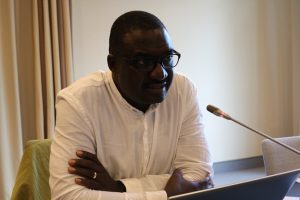As the African Group of Negotiators on Climate Change (AGN) Lead Coordinators meet to strategise for the 60th session of the UN Climate Change Subsidiary Bodies (SB60), the group has highlighted the shifting dynamics in the negotiation processes and the need to be vigilant.

Interim AGN Chair, Dr. Alick Muvundika, urged the group to pay particular attention and remain vigilant on the importance of established procedures within the UN climate framework to avoid being short changed.
“We have to remain vigilant and respectfully challenge manoeuvres aimed at circumventing established procedures within the UNFCCC. For example, as a group we noticed some procedural issues regarding the agenda at the first workshop under the UAE-Belem work programme on indicators for measuring progress achieved towards the targets of the Global Goal on Adaptation (GGA), where some established procedures were allegedly breached, as the agenda focused on substantive issues without prior notice to Parties. This was in addition to the nomination process, which was also characterised by non-procedural issues,” said Dr. Muvundika, when he officially opened the meeting in Bonn, Germany.
And the AGN Chair also highlighted health and climate as an emerging subject worth of the group’s active consideration, saying health was fast becoming a key agenda within the climate space in relation to the GGA framework, and called on the group to take keen interest and support African governments as they navigate the impacts of climate change on health.
“A crucial point for us to ponder under the UAE-Belem work programme is the inclusion of health as one of the thematic targets. Instead of waiting for this agenda to be set by others, we should, as a group, be actively involved and the work programme offers a window for us to input terms of how health should be mainstreamed into climate negotiations. As AGN, we have the AAI, which stands out as a shining example of our capacity to set our own agenda in these processes,” said Dr. Muvundika.
In addition to the UAE-Belem work programme, the AGN Chair further highlighted operationalisation modalities for the Loss and Damage Fund; the Just Transition work programme; Mitigation work programme; the New Quantified Goal on finance (NCQG), Joint work on Agriculture, and the unfinished business under Article 6 on carbon trading mechanisms, as some of the key priorities for Africa at the SB60 session.
With recent deadly floods in East Africa, particularly in Kenya, drought in Southern Africa, and fatal heat waves in the Sahel region, the discussions have been on what the Loss and Damage Fund can or cannot do for the African region as it continues to face climate-induced losses and damages.
“All eyes are on this process, and I have no doubt that our team on the Board is doing everything to secure Africa’s interests as the fund gets fully operationalised. Crucially, this year, central to all these discussions are the negotiations under the New Quantified Goal on finance (NCQG), which is the main theme and focus for COP29. As SBs usually set the tone for COPs, there is substantial work to be discussed under all the aforesaid thematic areas, and our full commitment and input is required,” said Muvundika.
Dr. Muvundika expressed gratitude to the AAI for its continued support to the AGN, emphasising the importance of home grown and Africa-led solutions to the climate crisis.
And speaking at the same event, AAI Technical Advisor, Kulthoum Mutsumi, emphasised the initiative’s commitment to supporting the AGN.
“The AAI was born from an idea of the AGN, supported and launched by all African Ministers and Heads of State. As you may be aware, the African Ministerial Conference on the Environment (AMCEN) gave the initiative a renewed mandate to continue supporting the African adaptation agenda and the AGN,” stated Mutsumi.
